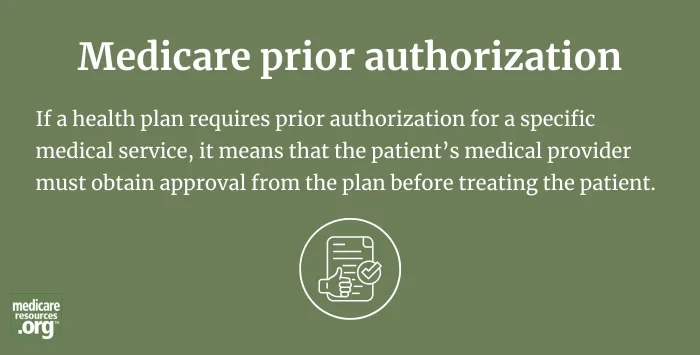
You're on your way!
You're being directed to a third-party site to get a quote.
Since 2011, we've helped more than 5 million visitors understand Medicare coverage.
By shopping with third-party insurance agencies, you may be contacted by a licensed insurance agent from an independent agency that is not connected with or endorsed by the federal Medicare program.
These agents/agencies may not offer every plan available in your area. Please contact Medicare.gov or 1-800-Medicare to get information on all options available.

If a health plan requires prior authorization for a specific medical service, it means that the patient’s medical provider must obtain approval from the plan before treating the patient. This allows the plan to determine whether the service is medically necessary and the most cost-effective option for the patient’s care.1
If a patient (or their provider) does not obtain prior authorization, the health plan may deny the claim, even if it would otherwise be covered.2 But a prior authorization approval is not a guarantee that the claim will be approved.3
Under Medicare rules, prior authorization works differently depending on the coverage that the person has.
Original Medicare requires prior authorization for only a very limited set of services. They include services that can be medically necessary in some circumstances, but are often used for cosmetic reasons, such as blepharoplasty (eyelid lift), panniculectomy (removal of excess skin and fat from the lower abdomen), and vein ablation to treat varicose veins.4
(To be clear, Medicare will not pay for elective cosmetic procedures, so the prior authorization process is necessary to ensure that if Medicare covers those services, it’s only in cases where they are medically necessary.)
Other services do not require prior authorization under Original Medicare. The program has rules about what services are covered. Those services are covered if they’re provided to an Original Medicare beneficiary (by a provider who hasn’t opted out of Medicare), and prior authorization is not needed.
The Centers for Medicare & Medicaid Services (CMS) has announced a new pilot initiative – the Wasteful and Inappropriate Service Reduction (WISeR) Model – to test the use of “enhanced technologies like Artificial Intelligence (AI) and Machine Learning (ML)” intended to expedite and improve Original Medicare’s prior authorization process, from 2026 through 2031,5 in Texas, Arizona, Oklahoma, Ohio, New Jersey, and Washington.6
The WISeR Model will focus on “select items and services that have been identifiedas particularly vulnerable to fraud, waste, and abuse, or inappropriate use.”5 This includes, for example:6
Medigap (Medicare Supplement Insurance) policies work in tandem with Original Medicare. So if Original Medicare covers a service, Medigap will play its role in paying some or all of the out-of-pocket costs (specifics depend on the plan),7 without any additional prior authorization requirements.
But if Original Medicare requires prior authorization (as detailed above) and that isn’t obtained, neither Original Medicare nor Medigap will cover the care.8
Almost all Medicare Advantage plans require prior authorization for at least some services. This often includes higher-cost services, such as inpatient hospital care, skilled nursing facility care, and chemotherapy.1
In 2023, when the number of people enrolled in Original Medicare and Medicare Advantage was roughly equal, Medicare Advantage insurers used prior authorization nearly 50 million times, while Original Medicare made just under 400,000 prior authorization determinations.1
In June 2025, private health insurers, including those that offer Medicare Advantage coverage, voluntarily committed to steps that will “streamline, simplify and reduce prior authorization” starting in 2026 and 2027.9
Medicare Part D prescription drug coverage (which enrollees can purchase as a stand-alone plan or as part of a Medicare Advantage plan) may require prior authorization before the plan will cover certain medications.10
Medicare Part D plans may require prior authorization when a drug has a lower-cost or safer alternative, or when a drug could potentially be covered under Medicare Part A or B, depending on the circumstances.11
A Health Affairs study found that Part D plans required prior authorization or step therapy (requiring patients to try a lower-cost drug before a higher-cost drug will be approved) for 11.5% of drugs in 2011, and that had grown to 14% by 2020.12
Footnotes